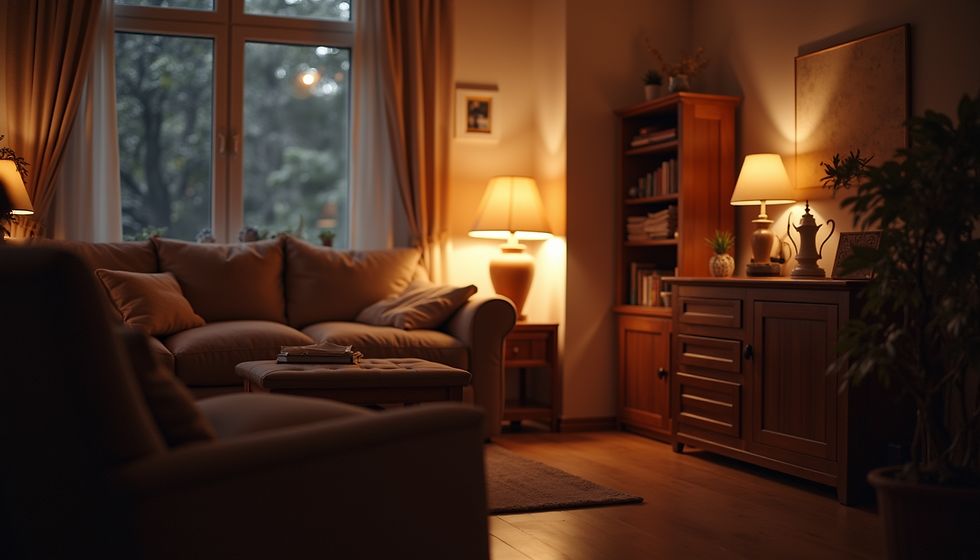The End of Summer: A Time for New Beginnings and Fresh Routines
- Laura

- Sep 13, 2024
- 4 min read
As summer comes to an end, many people experience a unique blend of emotions—anticipation, excitement, and sometimes a twinge of anxiety. The transition from the warmth and freedom of summer to the structure and routine of Autumn can feel overwhelming.
For those dealing with anxiety, the end of summer may bring about a sense of unease or apprehension. But what if we reframed this period as an opportunity for growth, new beginnings, and a time to refocus on what truly matters?

Understanding the Seasonal Shift and Its Impact on Our Minds
Seasonal changes can have profound effects on our mental and emotional well-being. Research suggests that changes in daylight, temperature, and daily routines can trigger shifts in mood and behavior. The transition from summer to autumn often coincides with significant life changes—like returning to work or school, adjusting to a new schedule, or preparing for the upcoming Christmas season. For many, these shifts can lead to feelings of anxiety or stress.
However, our brains are remarkably adaptable. The concept of neuroplasticity—our brain's ability to reorganize itself by forming new neural connections throughout life—shows that we can train our brains to respond differently to these seasonal changes. Instead of viewing the end of summer as a loss, we can consciously decide to see it as an opportunity for renewal and positive change.
The Science of New Beginnings: Why Autumn Can Be a Time for Growth
Psychologically, humans are wired to find comfort in routine and predictability, which can make transitions challenging. However, research shows that periods of change, like the end of summer, offer a unique opportunity to reset habits and routines. According to a study published in the European Journal of Social Psychology, people are more likely to make positive changes in their lives during “temporal landmarks”—moments that mark the end of one period and the beginning of another, such as the end of a season.
The end of summer is one of those key moments. Just as we use New Year’s resolutions to set goals for the coming year, we can use the end of summer to refocus our priorities, establish new routines, and set intentions for personal growth. This shift in perspective can reduce anxiety by creating a sense of purpose and direction.
Creating New Routines: A Path to Reducing Anxiety
When faced with the end of summer, consider how you might harness the power of new routines to support your mental health. Studies have shown that having a regular routine can help reduce anxiety and improve overall well-being. Routines provide structure, which helps us feel more in control, especially during periods of change or uncertainty.
Start Small and Be Consistent: Begin by identifying small, manageable changes you’d like to make. Maybe it's going to bed 30 minutes earlier, starting your day with a mindfulness exercise, or setting aside time each week for a hobby. Consistency is key. When these new behaviors become habits, they create a sense of stability that can help counterbalance anxiety.
Prioritize What Matters: The end of summer offers a perfect opportunity to reflect on what is truly important to you. Are there areas of your life that need more attention or alignment with your values? Perhaps it’s nurturing relationships, investing in personal growth, or focusing on self-care. By identifying what matters most, you can establish routines that align with these priorities, which has been shown to improve mental well-being.
Embrace Change as Growth: Recognise that change—even when it feels uncomfortable—is an essential part of personal growth. According to psychologists, our brains respond to novelty and change by creating new neural pathways. This not only enhances our cognitive flexibility but also our ability to handle future changes more effectively. By reframing change as an opportunity for growth rather than a threat, we can reduce anxiety and build resilience.
Using Mindfulness to Navigate the Transition
Mindfulness practices can be particularly helpful during transitional periods like the end of summer. Mindfulness involves paying attention to the present moment without judgment, which can help reduce anxiety by keeping us grounded in the “now” rather than worrying about the future.
Research published in the Journal of Anxiety, Stress, and Coping found that mindfulness practices can significantly reduce anxiety and improve emotional regulation. Try incorporating mindfulness exercises into your new routine—whether it’s through meditation, mindful breathing, or simply being present during daily activities.
Reach Out for Support if You Need It
Transitions can be difficult, and it's important to acknowledge that it's OK to feel uneasy or anxious during this time. If you find that your anxiety feels overwhelming or persists despite your best efforts, consider reaching out to a mental health professional, friends, family or a supportive community. Sometimes, simply talking through your feelings can make a big difference.
A New Season, a New Opportunity
As we bid farewell to summer, let’s embrace this seasonal transition as a chance to start anew. Remember, every end is just a new beginning in disguise. If in doubt, reach out—you don’t have to navigate this journey alone.
Let’s welcome the end of summer not with anxiety, but with a renewed sense of purpose and hope. The next season is yours to shape.




Comments